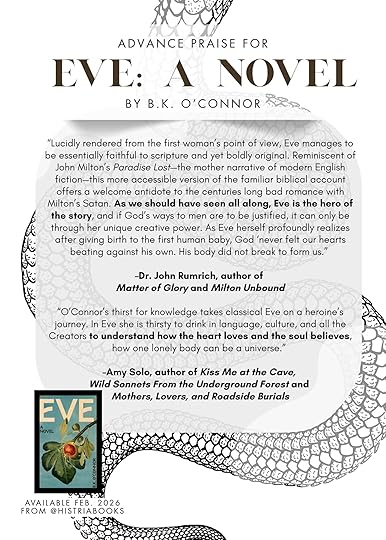B.K. O'Connor's Blog
July 25, 2025
EVE: A Novel
Becky Kivlovitz O’Connor

Design by Caleb Cleland (@skeletonhead_art.design)
Eve’s ComebackAfter centuries of bad PR, Eve is making her comeback. Stickers on Etsy proclaim, “EVE WAS FRAMED.” “Eat the Fruit” or “Take a Bite” is often paired with juicy, forbidden-fruit art on tote bags and T-shirts.
In redeeming Eve, the serpent has become a symbol of transformation, not evil. Golden serpentine rings and snake tattoos proclaim feminine rebellion and power. TikTok trends showcase “POV: You’re Eve and you just bit the apple and it’s so worth it,” and feminist creators role-play Eve as sarcastic, witty, and ready to take another bite. My personal favorite: Maegen McAuliffe O’Leary’s viral 2024 poem, “What I Would Tell Eve:”
Eat the fucking apple.
They are going to blame you
regardless.
You might as well go to the gallows
with a full belly
knowing more than God.
Eve was not some passive harbinger of sin. She was our intellectual hero. A first feminist.
Proto-FeministsFor much of human history, societies were not inherently patriarchal. Archaeological evidence, as explored by Maria Gimbutas in The Civilization of the Goddess, suggests that Neolithic Old Europe thrived under matristic, egalitarian structures. Women held significant spiritual and social authority.
Riane Eisler’s The Chalice and the Blade expands, proposing that early human communities followed a partnership model rather than the dominator hierarchies we experience today. The Minoan civilization, as well as indigenous societies like the Haudenosaunee Confederacy, maintained systems with women at the helm. In cultures such as the Mosuo of China and the Minangkabau of Indonesia (both retaining their matrilineal traditions today) power was passed through the female line, and women ruled in both the household and community.
In ancient Celtic traditions, female deities and symbols of fertility (breasts, vulvas, or full-bodied female nudes) were revered and prominently displayed. These symbols were often carved into sacred sites, including stones, temples, and later churches, in Ireland where goddess worship had a long-standing presence. With the rise of Christianity, there was a purification effort to erase pagan elements, especially those tied to female power and sexuality. They *physically* revised history, defacing carvings of breasts, vulvas, and wombs on places of worship, chipping away symbols of female fertility and reproduction that were seen as threatening to patriarchal Christian doctrine. In some cases, these symbols were reinterpreted: Sheela na Gigs (carved female figures, squatting, holding their labia wide open to the world) were left intact but recontextualized as warnings against lust, tainting these sacred, icons of fertility and female sexual empowerment. This act symbolically and literally removed female reproductive power from sacred spaces, exiling the feminine from the spiritual realm.
Eve’s RedeemersMargot Adler writes, in her book Drawing Down the Moon, “...the story of Adam and Eve, as commonly interpreted, has probably done more to debase and subjugate women than any other such tale in Western history.”
In Eve’s case, much of the latent female oppression in today’s society stems from her passive, misunderstood role in Genesis. She was “weak.” She couldn’t “resist the temptation.” 1 Timothy 2:11-15 reads, “Let a woman learn in silence with full submission. I permit no woman to teach or to have authority over a man; she is to keep silent. For Adam was formed first, then Eve; and Adam was not deceived, but the woman was deceived and became a transgressor. Yet she will be saved through childbearing, provided they continue in faith and love and holiness, with modesty.”
The three major monotheistic religions depict Eve as harbinger of sin, as weak, as susceptible to temptation–but what an egregious misinterpretation of the story!
Adler continues, “...only by turning over biblical tradition and regarding Eve positively, as the bringer of knowledge and consciousness, can we end permanently the split between mind and body and hatred of both that was foisted upon us…”
Elizabeth Cady Stanton penned The Women’s Bible in 1895, explaining, “[Lucifer] did not try to tempt [Eve] from the path of duty by brilliant jewels, rich dresses, worldly luxuries or pleasures, but with the promise of knowledge, with the wisdom of the Gods. Like Socrates or Plato, his powers of conversation and asking puzzling questions were no doubt marvelous, and he roused in the woman an intense thirst for knowledge, that the simple pleasures of picking flowers and talking with Adam did not satisfy.” She painted Eve as noble, intellectual.
Phyllis Trible continued Stanton’s work, another pioneering feminist biblical scholar. Trible challenged traditional patriarchal readings in the 1970’s. In her influential work God and the Rhetoric of Sexuality, Trible argued that Eve is not inferior to Adam but rather a superior symbol of strength and intelligence. Trible famously contended, “[Eve] contemplates the tree, taking into account all the possibilities. The tree is good for food; it satisfies the physical drives. It pleases the eyes; it is esthetically and emotionally desirable. Above all, it is coveted as the source of wisdom (haskil). Thus the woman is fully aware when she acts, her vision encompassing the gamut of life. She takes the fruit, and she eats. The initiative and the decision are hers alone. There is no consultation with her husband. She seeks neither his advice nor his permission. She acts independently. By contrast, the man is a silent, passive, and bland recipient…”
I found Eve’s power, separate from Adler, Stanton, and Trible, in an unexpected place. In an undergraduate John Milton class, I was tasked with memorizing 90 lines from Paradise Lost. I chose the moment right before Eve took from the fruit. Sure enough, Eve’s logic (as penned by Milton) was infallible. Rather than spend her days in blind allegiance and ignorance, she decided to take a bite of fruit. She was an intellectual hero. My own hero, and I followed suit—learning to take bites when I was forbidden.
As Eve considered the forbidden fruits before her, in Book IX of Paradise Lost, she asked, “...good unknown, sure is not had, or had / And yet unknown, is as not had at all. / In plain then, what forbids he but to know, / Forbids us good, forbids us to be wise? / Such prohibitions bind not…” (Milton 9.756).
Eve is our fearless mother of creation. She took us from blindness into sight. She turned us from the allegorical cave, and chose instead, the wide world. And Eve is not alone! Our “Eves” are plentiful throughout creation myths: Pandora, Lilith, Psyche, Innana, Io, and Persephone (to name a few) punished for overstepping, for seeking too high…and it is up to us to rewrite her story. To turn back time from the onset of the patriarchy and clarify the truth in the myth.
Eve by B.K. O’ConnorWith my own feminist, Paradise Lost retelling, I seek to justify Eve’s curiosity, to defend her exploration and the much-maligned pursuit of knowledge as the greatest good. Eve’s fall was our awakening, not our weakness. Adam was ready to live an eternity in ignorance, because the low hanging fruits were good enough. It was Eve who dared to reach higher. It was Eve who gave birth to human consciousness. Eve was wise: to take, to eat.
Our every advance, our every discovery, our every breakthrough is the spirit of Eve. It is Eve who is the creator of progress.
With Eve, I aim to upend physical and exegetical falsehoods—to re-open Abrahamic stories to interpretation, following in the footsteps of Adler and Trible, rather than keep them held above examination, further solidified as the only way. I want to defend Eve’s choice to know. She was not deceived; she was wise. Ignorance is bliss, but only in the shallowest sense. For knowing this, Eve was always the hero of the story.
In Eve, I ask readers to reimagine our origin story. I unwrite to undo the unfair subjugation women have experienced for millennia. To rewrite, and to unearth our power, mind, body, sex, and knowledge, as women.
Eve reclaims her power. Amidst the classical story of Original Sin, Eve, our hero, rightfully hungers for knowledge, questions, and stories on her quest to experience a life of meaning.
Eve does not stay and submit to Adam. Instead, Eve embarks upon an odyssey from Nippur to the coastal city of Canaan and across the Aegean Sea to Cyprus. She dares to complete what she began with her first bite of forbidden fruit—to know her own power. For who before her has known the minds of the gods?




